
Enough people expressed an interest in this, so here I am, about to tell you one of the ways to write Superman correctly. There are any number of ways to write him. This one is mine and is how I’d write him if I ever got the chance.
1/34
1/34
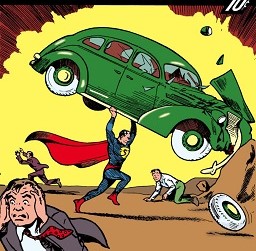
Not surprisingly, Alan Moore is my main influence in this, but not based on “Whatever Happened to the Man Of Tomorrow?” No, Moore summarized my approach to Superman in this sequence from WILDCATS #26:
2/34



2/34

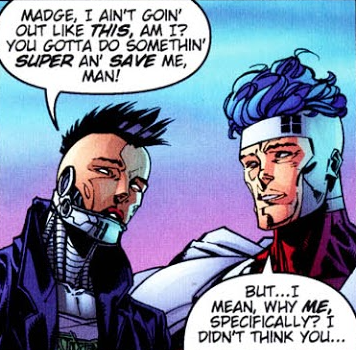
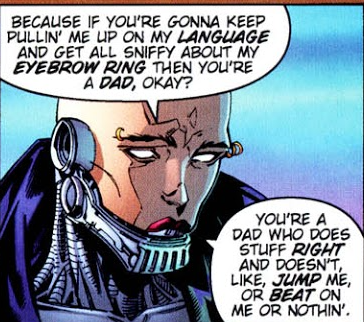

Superman as Super-Dad. Superman, as a literally superior being who loves humanity and puts himself in a position to protect and nurture us, to shield us from damaging influences and people, and to help us grow—to be the sort of father that Jonathan Kent was to him.
3/34
3/34

The comics don’t usually talk about Jonathan Kent’s approach to being an adoptive father—how he raised Clark during the Terrible Twos & Threes, how he comforted child Clark when he was sad or sick—but it’s clear that Jonathan was a kind, loving, even gentle father.
4/34
4/34

It should be no surprise that Clark, as Superman, would model his parenting tactics toward humanity—his de facto children—on his father’s. Nor that as Superman he continues to love humanity despite Everything. His father’s love was likely unconditional. So is his.
5/34
5/34
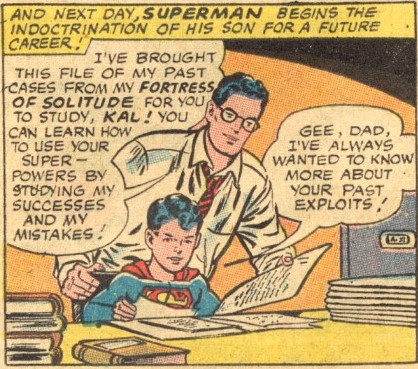
I’ve talked about this before to various people, and sometimes I get pretty strong negative reactions, which used to surprise me, but I think I’ve figured it out. American society, like American superhero comics, is going through an anti-father phase.
(let me finish)
6/34
(let me finish)
6/34

I know, I know—I have in fact seen popular culture over the past forty years. But take a close look at how fathers are treated. The majority of the time—I’d say the *vast* majority of the time—they are shown as very flawed characters—more flawed than other characters are.
7/34
7/34

Stupid Dad is a standard sitcom character. (Hello, Homer Simpson). Dad Who Doubts His Children is a standard adventure/action character. (The kids always need to prove themselves to their unreasonable, overly critical fathers). Disney Dads. (Disney Dads).
8/34
8/34

In superhero comics, fathers (and father figures) are there to be shown as critically flawed. Put it this way: name an unsullied, genuinely good father of a superhero (not including Jonathan Kent). Batman? Nope. Wonder Woman? No father. Aquaman? Ha.
9/34
9/34
Iron Man? Dr. Strange? The Hulk? Captain America? Black Widow? Hawkeye? Any of the Fantastic Four? Nope, nope, and nope. Let’s face it: with rare exceptions, fathers and father figures in comics now are there to act as antagonists to the heroes & heroines.
10/34
10/34
(I wanted to attach a picture of Darkseid to that last tweet, but Twitter didn't like me doing "that").
10.5/34
10.5/34
I think this mirrors American culture at large. We seem to valorize fathers, but only certain kinds, and only in certain circumstances. If you’re not a macho silent type as a dad, you’re so flawed as to be worthless as a parent.
11/34
11/34
What about mothers, people sometimes reply? Yes, of course American culture treats mothers even worse—but I’m talking about fathers here, not mothers. American toxic misogyny doesn’t preclude anti-father characterizations and rhetoric.
12/34
12/34

Superman imitates his father in being an exception to this. Superman is kindness, compassion, and love, as well as a moral example for humanity and someone who through his actions and statements shows humanity a better way of living.
13/34
13/34
This, I suspect, is why so many men dislike Superman and find him “boring.” Because these anti-Superman men don’t like being told or shown what to do, either in real life or in fiction. (One imagines their relationships with their own fathers are fraught).
14/34
14/34

It is true, though, that a certain percentage of comics readers don’t enjoy Superman comics. I blame those comic book writers who can’t conceive of a way to make a morally upright character interesting and entertaining. Naturally, I have a solution to that.
15/34
15/34

Superman as Super-Dad. Loving, compassionate, and kind. What are some other things we associate with dads?
Dad jokes. See, my Superman has a big sense of humor—you’d have to, in his position—but he loves telling Dad jokes. He loves making people laugh, even while groaning. 16/34
Dad jokes. See, my Superman has a big sense of humor—you’d have to, in his position—but he loves telling Dad jokes. He loves making people laugh, even while groaning. 16/34

Were I to write Superman, I’d emphasize how his sense of humor accompanies his loving kindness. He’s not a wisecracking hero like Spider-Man, but he sees the humor in many things, and among other heroes or with Lois he lets it show sometimes in a Dad joke.
17/34
17/34

The others call him “corny” or “cringe,” but they mean it with complete affection, and that’s how he takes it.
Kindness, compassion, and humor. What else? Deep patience—which you have to have as a parent, and which Superman would have great supplies of.
18/34
Kindness, compassion, and humor. What else? Deep patience—which you have to have as a parent, and which Superman would have great supplies of.
18/34

How else to love humanity when examples of it—the supervillains—let you down so often? Patience with their flaws and flawed actions, a willingness to be patient until they reform, and a desire to, when necessary, punish them appropriately but not excessively.
19/34
19/34

So he’s willing to put, say, Lex Luthor in jail, but he’s absolutely opposed to vigilante killing of supervillains or the death penalty, for those things rob supervillains of their chance to reform and to do good deeds as penance for their crimes & sins.
20/34
20/34

Superman, as Super-Dad, is mature & very wise—but that just means he knows that it’s not up to him to be the arbiter of anyone’s fate.
So my Superman has kindness, compassion, humor & patience. What else? How about the specific things that keep Lois Lane with him?
21/34
So my Superman has kindness, compassion, humor & patience. What else? How about the specific things that keep Lois Lane with him?
21/34

We know why Lois was initially attracted to him. But we haven’t seen nearly enough of those characteristics which are essential in a relationship—the things that make Lois (who, don’t forget, is the best & most accomplished person in her world) *stay* with him?
22/34
22/34

My Superman gently teases Lois to make her smile. He hears her out and pays attention when she speaks. He does the little things she likes: the dishes, putting his clothing away, taking the garbage out, making the bed, straightening up, etc.
23/34
23/34

In other words, he does the chores that she, big-time reporter and Pulitzer Prize winner that she is, has neither the time nor the energy to do. He supports her in her work and values her time, so he does the stuff (at super-speed, naturally) that she doesn’t want to do.
24/34
24/34

What else does he do? Surprise gifts at home—little ones, like an Atlantis snow globe (look! You can see a little Aquaman inside it) or a set of those pens she likes. Tiny kindnesses—no dramatic gestures or speeches, just the maintenance work relationships require.
25/34
25/34

And of course they’re great in the sack with each other. He’s GGG, and so is she with him. Physical love is a part of most people’s relationships, and my Superman is always DTF with Lois, and vice-versa. Superman knows some aces, of course, but he’s not one.
26/34
26/34

(Superman can figure out how to turn his powers off for long enough to safely make love with Lois. He’s Superman, remember?)
How does all this manifest in the actual stories? As secondary material, not primary—in the B-plots.
27/34
How does all this manifest in the actual stories? As secondary material, not primary—in the B-plots.
27/34

Fun though a “24 hours with Lois & Clark” issue would be, DC wouldn’t print it. No, my Superman stories take the Lone Wolf & Cub approach: there’s no supervillain to really challenge Superman, so the stories are primarily about the villains & secondary characters.
28/34
28/34

Superman appears at the end of the A-plot to clean up messes, defeat those villains who are foolish enough to challenge him, and to take them off to jail. Superman is the Overman: impossible to confront and defeat. So use him as a plot device instead.
29/34
29/34
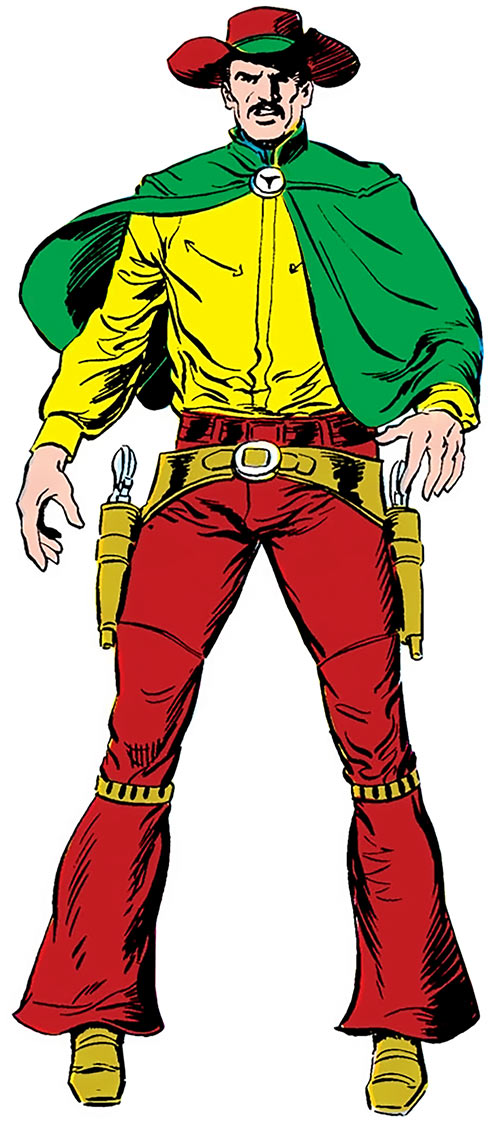
Villains will villain, but there’s always a final act in such stories & Superman is the personification of the curtains coming down on those stories. Don’t waste more than a couple of panels showing him fighting a villain—spend the time in conversation with Luthor instead.
30/34
30/34

This would also be a great opportunity to spend time with Superman’s villains—to give them character beyond “Grrr argh hate Superman”—and also to rehabilitate some of Superman’s older, forgotten, and/or obscure villains.
31/34
31/34

I’d do a six-issue run—I’m sure DC wouldn’t want to do this as a twelve-issue run, although I’d love to stretch it out that long—in which every villain came from the 1940s & 1950s and hasn’t been used recently, if at all since then.
32/34
32/34

So: #1: “The Toyman’s Tricks of Terror!” #2: “The Archer’s Final Shot!” #3: “It’s Libel when I say it is, cries Alex Evell!” #4: “Take a Class with the Crime Professor!” #5: “Change or Die, says the Evolution King!” #6: “J. Wilbur Wolfingham’s Greatest Flimflammery.”
33/34
33/34

So that’s how I’d write Superman. No epic plots, no grandiose rhetoric, no life-or-death situations for Superman. Just lots of characterization, opportunities to show why Superman’s interesting, and relationship banter with Lois Lane.
Thanks for reading!
34/34
Thanks for reading!
34/34
• • •
Missing some Tweet in this thread? You can try to
force a refresh





